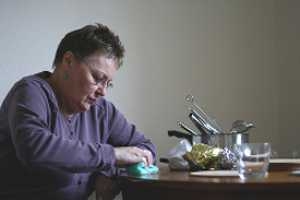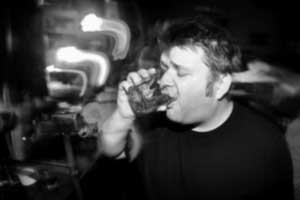Achieving Alcohol Withdrawal
5 tips to help you withdraw from alcohol abuse
 "Achieving Alcohol Withdrawal" courtesy of banoootah_qtr
"Achieving Alcohol Withdrawal" courtesy of banoootah_qtrOnce upon a time, a young puppy found himself covered in fleas. He scratched and itched and rolled in the dirt, but still the fleas tormented him. After a time, he noticed a clear pool of water. Being a clever pup, he ever so slowly (so as not to alert the horrible fleas) immersed himself in the cooling waters. Because he did this bit by bit, the fleas didn't know what was happening and very soon the pesky fleas floated from his coat, leaving the dog clean, clear, and comfortable again.
Alcohol withdrawal needs to be approached in just the right way and if you have been drinking profusely, then I urge you to seek medical assistance. The tips in this article can be used as an adjunct to supervised medical alcohol withdrawal.
A former client of mine, Gavin, had been through a series of life setbacks and his drug of choice had always been alcohol, strong and plenty of it, when times were tough. But of course the attempted escape through alcohol quickly became its own trap and created way more problems than it solved.
"I've had the DTs (delirium tremors) really bad. Sometimes I can barely stand up and the urge to drink again can feel overwhelming. I've gone cold turkey before, but this time I just feel like I need more support."
I really enjoy helping people quit, withdraw from, and stay off alcohol. To see people reclaim their life and return to health is wonderful. Gavin was a nice guy, at least when sober, and over the weeks as he journeyed away from alcohol he began to truly live his life again and felt relief at not "hiding behind booze" as a way of trying to cope. But what are the things you can do for yourself to really facilitate a more comfortable withdrawal and also keep your resolve strong?
1) Remember why you're quitting
Alcohol is a thief, albeit a charming one. It cons us into blindly using it but doesn't deliver what it seems to promise. People misuse alcohol feeling that somehow it will provide them with company or a sense of meaning or excitement or distraction or comfort. The fact is that it seems to provide these things for a short while, but the law of diminishing returns kicks in.
Alcohol the 'friend' turns nastily into some kind of vicious bullying loan shark that mercilessly demands payback. And boy, was the payback huge for Gavin. He'd lost his job, his wife, his house. "You're right!" he said to me, "Alcohol has lied and stolen. I actually hate what it's done!"
Reflect too on what you're moving away from as you withdraw completely:
- Alcohol (ethanol) is used in adhesives and disinfectant to break down cells, and that's exactly what it does in your brain. As a depressant, alcohol can trigger episodes of depression, anxiety and lethargy, brain damage (Korsakoff's syndrome), and Parkinson's disease.
- Heavy drinking causes a drop in testosterone levels, testicular shrinkage, and impotence in men. In women it severely damages fertility.
- Excessive consumption of alcohol leads to an increased likelihood of getting sick from most cancers.
If you're ever tempted to view alcohol wistfully though rose-tinted specs, just dwell on how much it has - or potentially will - steal from you and your life.
2) Get your vitamins
Alcohol strips your body of essential vitamins such as vitamin B1 and zinc. Of course, a medical professional should advise you as to what supplements you need, but as a general rule, ditch the junk food and limit or quit caffeine. Your blood sugar levels need to be as stable as possible to avoid side effects of withdrawal such as insomnia and agitation. Eat plenty of green leafy vegetables, fruit, and lean meat and fish. Your body all the backup and support you can provide it. And drink plenty of water to replace the moisture alcohol has stripped from your organs.
3) Start getting your real needs met
People turn to drinking too much alcohol when their life is unsatisfying to them in some way. We all have needs that must be met in order to feel happy and be healthy. Knowing what you really need in life is an important step. Alcohol may seem to fill a gap but, of course, it very soon starts preventing the completion of real needs.
We all need to:
- Feel safe and secure in our lives (at least some of the time). Some people may use alcohol as a way of trying to deal with fear but it can lead to great emotional instability.
- Regularly have and give quality attention with other people.
- Feel a sense of influence and control over our lives; out-of-control drinking severely compromises this need.
- Enjoy friendship, fun, love, and intimacy with significant people.
- Feel part of a wider community.
- Feel a sense of status; basically, feel we have a recognizable role in life. This also connects to a sense of competence and achievement.
- Feel stretched but not stressed to avoid stagnation and boredom, and to enhance self-esteem.
The more these needs are met naturally through life rather than through a bottle, the less we feel like trying to take shortcuts with intoxicants.
Gavin and I focused on rebuilding his life bit by bit. He started to see friends again and make new ones, exercised, and eventually returned to work. He re-established his relationship with his parents, went out to see movies, and began to read science fiction again. In short, he started to get what he really needed.
Think about these needs and how you can make conscious efforts to meet them naturally.
4) Forget about 'withdrawal'
When I work with people withdrawing from alcohol, I like to reframe the idea of withdrawal (a word that, frankly, has painful connotations) to that of 'healing'.
Each day you gain free and away from alcohol, you heal a little more. The cells of your body are healing; your brain cells are starting to make new connections; if you're a man, your 'male hormone' testosterone will be increasing, which gives you more lean muscle mass and makes you more masculine in all kinds of ways.
Don't talk or think about 'withdrawal'; rather, focus on the productive process of your body and life beginning to heal.
5) Relax regularly
It's important that you relax as much as possible. Relaxation will speed your healing. When you relax deeply, your blood pressure normalizes, your immune system works better, and your sleep improves (1).
Relax by listening to a hypnosis session for drinking, get outside and walk, do healthy stuff that you enjoy, take time to breathe deeply and slowly to really get your mind and body working for you. And when you relax, you can use visualization to help your body speed up its recovery.
Gavin loved the relaxation part of his therapy. "I can't tell you how much of my life has been spent feeling anxious!" And alcohol had become yet another source of anxiety for him.
Gavin is now leading a toxin-free life and you can too.
References
- Professor Herbert Benson, MD, went as far as to say: "Regular elicitation of the relaxation response has been scientifically proven to be an effective treatment for a wide range of stress-related disorders. In fact, to the extent that any disease is caused or made worse by stress, the Relaxation Response can help."






